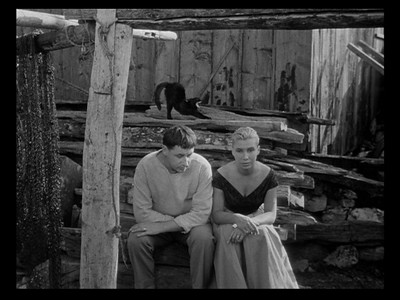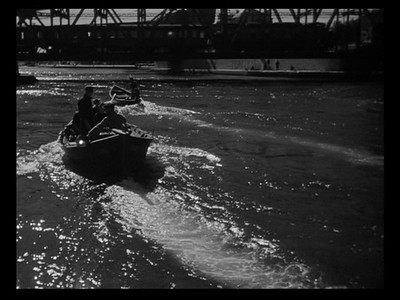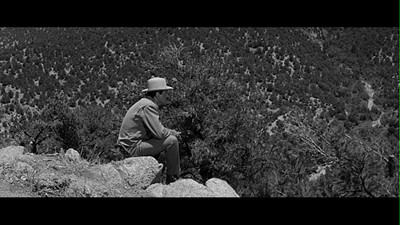"
I came to make noise, but silence has won out."

Agnès Varda is one of the less celebrated directors working amidst the French New Wave, always seeming just a little bit outside of the irascible boys club that sprang out of
Cahiers du cinema. I get the sense, though, that this may be how she wanted it to a degree. Though I haven't seen a ton of her films, the ones I have seem strike me as being more about observation, about a certain separateness. The director making the film likes to watch, to chronicle, and I imagine her as someone who was always there, maybe not as prolific as
Truffaut or
Godard, but never absent nonetheless.
Her first film,
La Pointe Courte, part of the
4 X Agnès Varda boxed set, actually predates the Nouvelle Vague by many years. Made in 1954, one could argue for it as the clear link between the French troublemakers and the Italian Neorealists who inspired them. Though the film is sold on the relationship element, the troubled marriage that is the hook of the film--its two participants, Silvia Monfort and Philippe Noiret, are the faces on the DVD cover--it's about much more than that, and I wouldn't argue with you if you said Varda had used the couple as an excuse to shoot the La Pointe Courte fishing village, that it was the people working the lagoon that really interested her. Indeed, the credits even say as much, with the auteur sharing writing credit with the citizens of La Pointe.
In fact, it takes us a long time to see the husband and wife, and even when we do, they spend their first scene with their backs to the audience. The first several minutes of the movie instead are spent establishing the difficult conflict of the fishermen. Their waters have been semi-quarantined due to allegations of contamination. They know the shellfish they harvest are not bad enough to be causing bodies to pile up, so they go ahead and fish anyway, their survival taking precedence over the slowly unwinding red tape that is trying to sort out whatever the problem may be. The early scenes in the film show how three generations of one family live on the same land, in interconnecting houses, and work together to throw the government off of their seaside scent when Grandpa is spotted in forbidden waters.

Varda and cameramen Paul Soulignac and Louis Stein move freely through these buildings, uninhibited by walls or even their equipment, capturing a sleeping cat here, a pile of shells there. The look is documentary, but the way the cameras fly over the landscape is almost epic, a working man's
David Lean shooting on DV. Like
De Sica, Varda is seeking the visual poetry of real life. The burly fisherman and their equally burly wives and daughters, the single mother with seven children by multiple men, the trash and debris scattered around an impoverished homestead--these are meals gobbled up by the hungry lenses.
La Pointe Courte isn't just a random setting, however, it's also a metaphor for that footnote of a relationship. Just as some unknown rancor has tainted the waters, the marriage between Elle (Monfort) and Lui (Noiret) also has something rancid under the surface that they are trying to uncover. They know they are unhappy, but the tests haven't been run to pinpoint exactly what is making them so. Lui grew up at La Pointe, and so he has devised a plan to leave the hustle and bustle of Paris and get back to the simple life of his hometown. It's a forced nostalgia for supposedly better times, and maybe if he can recapture his childhood, he can also rediscover the salad days of early wedded life from five years before. There have also been five days that he has waited for Elle to join him there, every morning going to the train station to see if his spouse is a new arrival. It's a romantic gesture, but futile in its way, just fumbling in the dark.
The way the couple walks the countryside, discussing their fracture, reminds me of the early '60s films of
Michelangelo Antonioni. There is also something of the endless discussions in
Alain Resnais' breakthrough films, and not for nothing is Resnais one of the credited editors on
La Pointe Courte. The way the mis-en-scene moves us through the rundown shacks of the village is like a Bizarro version of the similar tours of grand mansions in
Last Year at Marienbad. The interesting contrast comes in the fact that for as natural as the footage of the fishermen feels, the stuff with the couple is stagy and heavily directed. They stare in the camera, framed by their surroundings and by the screen, speaking in poetic musings in direct juxtaposition to the less mannered dialogue of the workers. Even the subtitles reflect this, with dropped consonants and slang showing the less erudite speech patterns of the regular folks. In fact, the townspeople think their visitors' main problem is they talk too much, and listening to their conversation go in ever-widening circles until they finally exhaust themselves, this theory appears to not be entirely wrong. Likewise, Elle and Lui can't merely walk somewhere, they are always entering a landscape, always creating a shot. Note how many times a train of some kind forces them to wait to cross its tracks, cutting them off from their destination the way Elle's not-taken trip had separated them for the previous week, the way their falling out of love splits them now.

"Nature separates us," Elle says at one point. She means that if a man and a woman come together and they really aren't meant to be, the time and tide of life will push them apart, but she's really summing up everything about
La Pointe Courte, isn't she? Style, fashion, the way of filming--this separates the couple from reality (just as it separated Hollywood convention from burgeoning international cinema). The pair couldn't be farther apart from the fishermen even when they are standing amongst them. It's this distance that has put the lovers where they are, they've lost sight of what's important. What are their petty problems next to the greater struggle for survival, the food chain, a dead child?
Yet, there is also hope to be had. Despite Lui and his lingering doubts, La Pointe works its charms on Elle. She finds peace in the unadorned existence of its people. The lesson she learns is that love is not about the passion of first romance, just as living isn't about the idylls of childhood or a day is not about the sunset that starts it. Sure, you can know that a better lagoon is just beyond a certain point, and that's where the best fish are, but just because you can't get there yet doesn't mean you shouldn't make do. Don't ever stop striving, but also don't strive at the expense of what is in front of you. Happiness isn't so easy to come by, and if it wasn't work, it wouldn't be worth it.





































